By ANDREA LOPEZ
Multimedia Editor
(WARRENSBURG, Mo., digitalBURG) — Nearly every 8.5 hours, the state of Missouri loses a resident due to suicide.
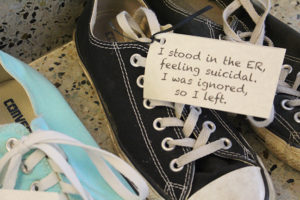
A New Jersey based organization called Attitudes in Reverse presented an exhibit in the Student Recreation and Wellness Center Tuesday afternoon that featured 118 pairs of shoes. The number 118 represents the number of youth that died by suicide in Missouri last year.
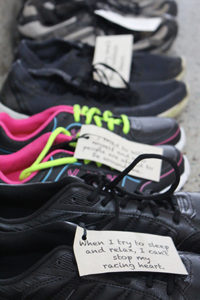
A New Jersey based organization called Attitudes in Reverse presented an exhibit in the Student Recreation and Wellness Center Tuesday afternoon that featured 118 pairs of shoes. The number 118 represents the number of youth that died by suicide in Missouri last year.
A New Jersey based organization called Attitudes in Reverse visited campus Monday and Tuesday to spread awareness about mental health illnesses and ways to prevent suicide.
Tricia Baker, co-founder and program director of AIR, alongside Shauna Moses, member of the board of trustees for AIR, presented the organization’s In Their Shoes exhibit, which caught the attention of many people passing through the Elliott Student Union and the Student Recreation and Wellness Center.
The exhibit featured 118 pairs of shoes that were each tagged with a message of lost hope. The number 118 reflects the number of young adults ages 10-24 who died by suicide in Missouri last year.
“The purpose of In Their Shoes is two fold: to let young people know that they are not alone in their thoughts and struggles, and we want to educate the 75 percent of the population who has no idea how hard it is to live with a mental illness,” Baker said. “People who say, ‘Just snap out it.’ You wouldn’t tell someone who has cancer to just snap out of it.”
When Baker lost her son Kenny to suicide in May 2009, just weeks before his high school graduation, she said the way the school handled his death led to the creation of AIR.
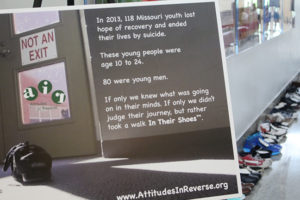
A New Jersey based organization called Attitudes in Reverse presented an exhibit in the Student Recreation and Wellness Center Tuesday afternoon to raise awareness of mental health and suicide prevention.
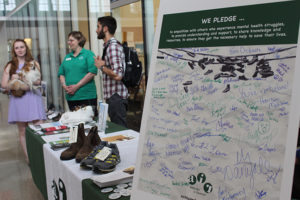
A New Jersey based organization called Attitudes in Reverse presented an exhibit in the Student Recreation and Wellness Center Tuesday afternoon to raise awareness of mental health and suicide prevention.
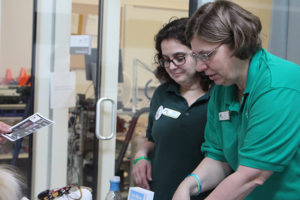
A New Jersey based organization called Attitudes in Reverse presented an exhibit in the Student Recreation and Wellness Center Tuesday afternoon to raise awareness of mental health and suicide prevention.
“They didn’t treat his memory well,” Baker said. “The principal called me saying they wanted to put a sticker over his picture in the yearbook – erasing his existence from the school.”
During the past five years, Baker has spoken to more than 25,000 students and continues to travel across the country to spread the word about suicide being preventable.
“We’re not just people who are getting paid a salary,” she said. “We’re volunteers – we sacrifice our own personal lives because this is so important. Suicide used to be the third leading cause of death of young people ages 10-24 – it’s now the second. It’s only getting worse.”
While it’s often hard to start the conversation about suicide, AIR relies on two popular tricks to get people to stop by their table: Miki, their mascot dog, and a pair of boots that belong to Supernatural actor Jared Padalecki.
After connecting with Padalecki before he launched his own mental health campaign called Always Keep Fighting, the actor made a donation to AIR and a relationship was made.
Beginning July 2015, Baker started attending Supernatural conventions as an AIR exhibitor.
“We’re giving them a platform to speak out,” she said. “People have so many stories and it’s not the kind of thing you would share when you’re having lunch with your lady friends. Everyone is bragging about their kids because we’re proud of our kids. When Kenny was alive, my brag would be that he got up – that was huge for him. But everybody else, ‘My kid is going to Spain with the Orchestra or my kid is valedictorian. My kid got up.”
While she has the experience of talking to large crowds, Baker said the battle they’re constantly fighting is getting the invite and space to share their message.
“That’s the old philosophy – if we talk to young people especially, about suicide, that we’ll put the idea in their heads,” she said. “What we know is that people with suicide ideations – it’s a chemical imbalance in the brain. Talking to somebody with a healthy brain, it’s not going to put that idea in their head.”
For Moses, she said she’s got firsthand experience of it. After losing her brother to suicide, Moses said she couldn’t fully understand the level of irrational thinking until she went through it herself.
“The thought of suicide was taking over – like a demon,” Moses said. “It’s very scary.”
After she attempted suicide, Moses said she miraculously had some rational thoughts and asked for help – which included getting a medical prescription.
“I’m still on medication and I’m not ashamed to say it,” Moses said. “I take medication for depression and I take medication for high cholesterol. They should be talked about on the same level – no judgment. They’re two different biological based illnesses and there should be no shame, embarrassment or criticism for either of them.”
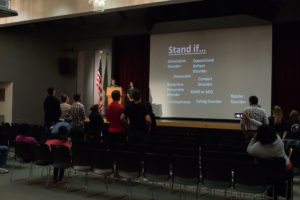
A New Jersey based organization called Attitudes in Reverse presented an exhibit in the Student Recreation and Wellness Center Tuesday afternoon to raise awareness of mental health and suicide prevention.
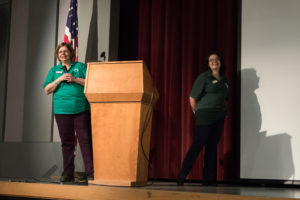
A New Jersey based organization called Attitudes in Reverse presented an exhibit in the Student Recreation and Wellness Center Tuesday afternoon to raise awareness of mental health and suicide prevention.

Miki is the mascot dog for Attitudes in Reverse.

A New Jersey based organization called Attitudes in Reverse presented an exhibit in the Student Recreation and Wellness Center Tuesday afternoon to raise awareness of mental health and suicide prevention.
When sophomore engineering technology major, Harrison Mehlman, attended a mental health training session for community advisers last fall, he was inspired to talk with others about bringing AIR to campus.
“I know in the past year there has been more than one student death by suicide, and not many people know this because no one wants to talk about it,” Mehlman said. “I feel that this community is a very open one that supports each other and supports diversity, but as far as mental health goes, it is still a hushed topic that people need to feel more comfortable talking about.”
AIR’s visit concluded with a PowerPoint presentation Tuesday night in the Elliott Student Union. The duo presented their education program called Coming Up for Air, which examined the signs and symptoms of mental health disorders and explored ways to seek help.
“Like any illness, the earlier you identify it and treat it, the more likely the success of the treatment,” Baker said.
When it comes to the college environment, Baker said alcohol intake plays a major role in those who take their stress out on substance use.
“Substance abuse is three to four times more prevalent in those with untreated mental health disorders than the general population,” she said.
Alcohol becomes a factor in 40 percent of academic problems and results in 28 percent of college dropouts, according to Turnbridge Addiction Treatment Program.
Molly Olten, senior public relations major, attended the event as a member of the UCM chapter of the National Alliance on Mental Illness.
“Mental illness is a battle that everyone is affected by, whether they personally suffer or know people who are,” Olten said. “I have family members and a close friend who have contemplated ending their lives. It is often difficult to understand the struggle and know when to reach out. I went to show my support and learn as much as I could about ways to help.”
The UCM Student Government Association funded the opportunity for AIR to present on campus.
For more information about AIR, visit attitudesinreverse.org.
National Suicide Prevention Lifeline: 1-800-273-TALK(8255)
UCM 24 hour confidential hotline: 660- 441-4855.












